Share
Working at ESO
Are you interested in working in areas of frontline technology and in a stimulating international environment? Do you feel your profile matches our requirements? Learn more about our current vacancies and apply online. Read more..
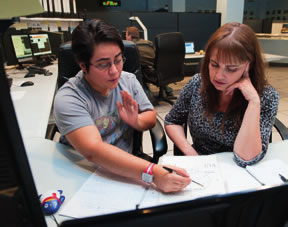
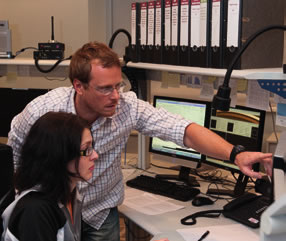

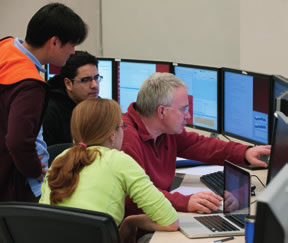
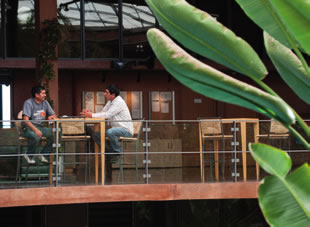
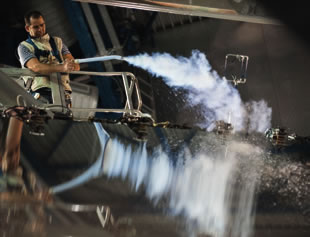
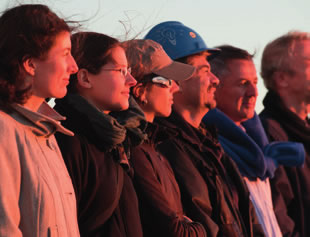
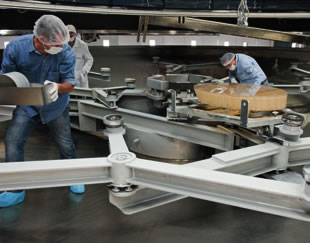
The European Organisation for Astronomical Research in the Southern Hemisphere (ESO) is the foremost intergovernmental astronomy organisation in Europe and the world's most productive ground-based astronomical observatory. ESO carries out an ambitious programme focused on the design, construction and operation of powerful ground-based observing facilities enabling astronomers to make important scientific discoveries.
ESO operates three unique world-class observing sites in northern Chile: La Silla, Paranal and Chajnantor (home to ALMA), and the ESO Headquarters are located in Garching, near Munich, Germany.
At Paranal, ESO operates the Very Large Telescope, the world's most advanced visible-light astronomical observatory, and will host and operate the southern array of the Cherenkov Telescope Array, the world's largest and most sensitive high energy gamma-ray observatory. ESO is a major partner in ALMA. On Cerro Armazones, ESO is building the 39-metre Extremely Large Telescope (ELT), which will become "the world's biggest eye on the sky" and whose operations will be fully integrated into the Paranal Observatory.
Due to the need for additional resources associated with the ELT and other programmes, for its Project Management Department (PMD), within the Directorate of Programmes (DOP) at its Headquarters in Garching, near Munich, Germany, ESO is advertising the positions of
Project Manager
2 positions
Garching
Deadline 31/10/2024
The Project Management department comprises a highly international group of 17 Project Managers leading a wide variety of projects that expand and strengthen the scientific and operational capabilities of our observatories in Chile. Your role will be to lead the development of astronomical instrumentation or Observatory sub-systems either for the ELT, the VLT or ALMA. These developments will enable scientists to answer key questions about the universe like understanding the nature of dark matter, or the study of Earth-like planets orbiting neighbouring stars. In a very real sense, you will contribute to answering key human questions like where do we come from, how did we get here and are we really alone. Our projects are usually developed in cooperation with consortium of astronomical institutes and eventually industry but, depending on the nature of the project, internal development of subsystems is also undertaken in-house. As a result, you will need to be adaptable and able to work with a wide variety of people from a range of backgrounds and across many disciplines. In addition to conducting such projects, you may have the responsibility to further develop and implement, in close cooperation with the Head of Department, elements of wider project management and product and quality assurance or digital transformation as exercised at ESO.
ESO recognises the importance of knowledge transfer and continuous professional development and so one of our vacant Project Manager positions could be an ideal opportunity for an early-career stage professional. Support and training will be provided on-the-job by other highly experienced Project Managers.
Main Duties and Responsibilities:
- Lead projects to develop and deploy systems, such as scientific instruments and sub-systems, forming a core project team with the project scientist and project engineer when applicable.
- Accountable for delivering projects to science community in specifications, in budget and on time. To achieve this goal, you will interact within the ESO matrix structure.
- Prepare and manage consortium agreements and industrial contracts.
- Actively carry out stakeholder management within and outside of ESO.
- Provide objectives and feedback for each of your matrixed team members to their nominated line manager in accordance with general procedures and policies.
- Proactively report project progress to Programme Managers within ESO.
- Provide input for reporting to ESO governing bodies.
- Lead teams for Assembly Integration and Test /Verification (AIT/V) at Paranal & Armazones in Chile.
- Frequently participate in project reviews in the role of reviewer, secretary or chair.
The above responsibilities are not exhaustive and a flexible approach and willingness to adapt to operational needs are required.
Reports to:
Head of the Project Management Department.
Key Competences and Experience
Essential Competences and Experience:
- At least three years of relevant professional experience in developing projects relating to instrumentation/optical systems.
- A strong technical background in a relevant discipline, e.g. opto-mechanics, electronics, control software, cryogenics etc.
- First-hand experience with the standard PM scope of tasks, schedule and resource planning, change and risk management, as well as demonstrated ability to build, develop, and lead multi-disciplinary project teams.
- Ability to monitor the progress of your work and that of the project team, deliver to agreed deadlines and standards, plan activities, contribute to system design and be able to work under pressure.
- Prepared to travel frequently, also to Chile to visit sites at altitudes of up to more than 5000 metres.
- Used to work both on own initiative and as a part of a team as either leader or collaborative team member.
- Ability to build strong collaborative working relationships with others from different cultural backgrounds and disciplines.
- Excellent communication skills with a strong sense for team spirit necessary to work in an international team environment.
Desirable Competences and Experience:
- Ability to work with partners from industry as well as academic or research institutions.
- Provide clear, concise and timely oral and written communication identifying key issues, examining options and proposing steps ahead.
- Willingness to acquire new technical and interpersonal skills, keep up-to-date with the tools used in the daily work and possess a proactive mindset towards self-development.
- Demonstrated critical thinking and problem-solving skills in relation to project management.
- Demonstrated diplomatic skills to facilitate the management of external consortia.
- A strong scientific background in a related field is considered an asset.
- Knowledge and experience with the development, testing or operations of astronomical instruments (optical and/or infrared, ground or space- based) is considered a valuable asset.
Qualifications
- Essential educational level: An advanced university degree in Project Management, Engineering or Physics or a related scientific/technical field.
- A first level university degree in combination with an additional two years of relevant working experience and/or additional technical qualifications will be accepted in lieu of an advanced university degree. Qualifications which would be an asset:
- Formal qualifications in project management would be deemed an advantage.
- Experience with organisational change projects will be a valuable asset.
Language skills:
A very good command of the English language - oral, reading and writing - is essential and a working knowledge of German or Spanish would be an advantage.
Remuneration and Contract:
We offer an attractive remuneration package including a competitive salary, comprehensive pension scheme and medical, educational and other social benefits, as well as financial help in relocating your family and support to place your child/children in daycare.
Our Salary Structure
ESO's salary structure is based upon a range of career paths which reflect the nature and level of our jobs. Each career path is made up of two or three grades which are used to further reflect experience.
Please follow this attached link for more details https://www.eso.org/public/jobs/conditions/intstaff/salary-structure/
ESO aims to support members of personnel in maintaining a good work-life balance (https://www.eso.org/public/jobs/conditions/intstaff/#work-life-balance) between their professional and private life. ESO is also committed to offering family-friendly support (https://www.eso.org/public/jobs/conditions/intstaff/#family-friendly-support), creating a work environment and policies which allow staff to balance their professional and private responsibilities through flexible working arrangements and financial support for families.
The contract is for a fixed term duration of three years and is subject to successful completion of the probation period. There may be a possibility of extension(s) subject to individual performance and organisational requirements, and as defined in the applicable policies and staff rules and regulations. For any further information, please visit ESO's conditions of employment (https://www.eso.org/public/jobs/conditions/). Please note that the contract policy and in particular the regulations concerning fixed-term and indefinite contracts are currently under review which may lead to changes in the contractual conditions applicable to this position.
Duty Station:
Garching near Munich, Germany with regular duty trips to ESO sites in Chile as required.
Indicative Career Path: V
Application:
If you are interested in working in areas of frontline science and technology and in a stimulating international environment, please visit http://www.eso.org for further details.
Applicants are invited to apply online at http://jobs.eso.org/. Applications must be completed in English and should include a motivation letter and CV. Within your CV, please provide the names and contact details of three persons familiar with your work and willing to provide a recommendation letter upon request. Referees will not be contacted without your prior consent.
Deadline for applications is 31 October 2024.
Interviews are expected to start soon after this date.
ESO Values
An important element in any successful employment relationship is harmony in values between an organisation and its people.
The ESO Values are:
ESO strives for excellence through innovation.
ESO provides outstanding services to its communities.
ESO fosters diversity & inclusion.
ESO believes in the key role of sustainability for its future.
Achieving the above are recognized as only possible on the basis of personal values and attitudes that we expect from our employees: respect, integrity, accountability, commitment, collaboration, and clear & open communication.
Applicants to any ESO role are asked to reflect on their affinity with these values and advised they may be asked about them if called for interview.
Diversity
ESO has established diversity as an important value of the Organisation, is committed to providing an equal opportunities environment and is actively seeking to promote a diverse, equitable and inclusive workforce. Please visit https://www.eso.org/public/about-eso/sustainability/dei-at-eso/ for further details.
Nationality
No nationality is in principle excluded from employment at ESO, however, recruitment preference will be given to nationals of our Member States, host states and strategic partners: Australia, Austria, Belgium, the Czech Republic, Denmark, Finland, France, Germany, Ireland, Italy, the Netherlands, Poland, Portugal, Spain, Sweden, Switzerland, the United Kingdom and Chile, irrespective of gender, age, disability, sexual orientation, ethnicity or religion.
